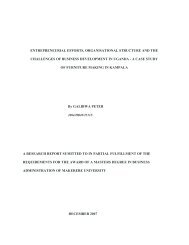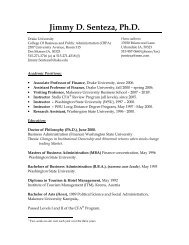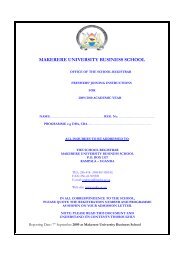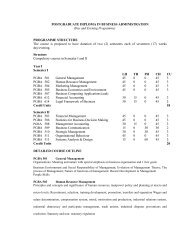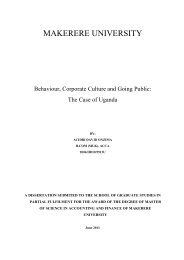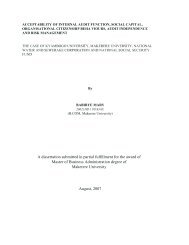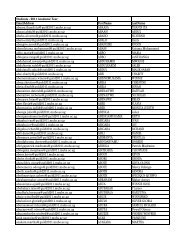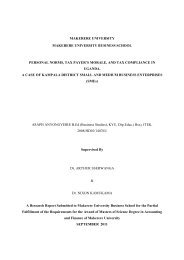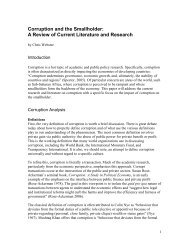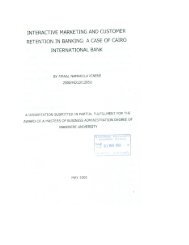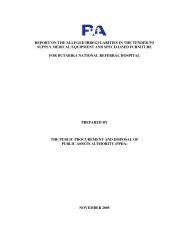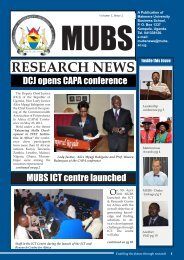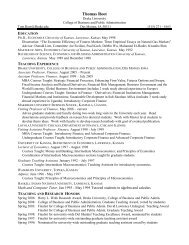13th Annual International Management Conference Proceeding
13th Annual International Management Conference Proceeding
13th Annual International Management Conference Proceeding
Create successful ePaper yourself
Turn your PDF publications into a flip-book with our unique Google optimized e-Paper software.
Conclusions<br />
From the findings, there is no doubt that all the participants experienced improved business performance as a result of<br />
the training. Therefore, the training had played a major role in business performance improvements experienced among<br />
participants in the two provinces. This is an indication that the training had a positive impact on their entrepreneurial<br />
activities. The environmental factors found from this study, include information from the training provider that there<br />
will be follow-up after the training. This agrees with findings from previous researches that when trainees are informed<br />
that there will be follow-up, they become more motivated to transfer training. It can be concluded that prior follow-up<br />
information and supervision are important for transfer of training in an agricultural context.<br />
Peer support and networks were also found to have played a significant role in the transfer of training in this context.<br />
Most of the participants consulted one another and had gone on to form community mobilization groups. In addition,<br />
they worked closely with extension officers. Consultation and guidance are crucial for transfer of training in an<br />
agricultural context.<br />
Community micro-finance programmes were also significant in the transfer of training in this context. The training<br />
programme did not have an in-built credit component and therefore, participants had to access funding from<br />
community micro-finance programmes to enable them participants implement their action plans.<br />
Other environmental factors included the availability of markets for the farm produce. With ready markets like<br />
schools, neighbours and supermarkets, most of the participants were able to farm and sell their produce. This was an<br />
aspect that motivated them to transfer as seen in the expansion of their farm activities. However, climatic conditions<br />
became a hindrance to the transfer of training to an extent. Most of the participants were not able to transfer the skills<br />
to their farming activities due to prolonged draught periods.<br />
Most of the participants had their attitudes towards farming changed; they were doing it as a business, not a routine<br />
activity as was the case before. Without a changed attitude, the participants would not have learnt any KSAs and<br />
would also not have applied them to their business activities. For instance, the Maasais had embraced crop farming as<br />
opposed to animal farming only.<br />
The one trainee ability that emerged as important across tasks and context was the general cognitive ability. This was<br />
true of this study as reflected in the participants’ ability to employ major cognitive processes such as evaluation,<br />
judgement, memory, recognition and action planning which were used in their daily activities. For instance, they made<br />
decisions regarding what crops to farm, when and in what quantity. This was further manifested in their innovative<br />
and risk-taking tendencies as well as their ability to keep business records, which they used to gauge which business<br />
activities were more productive and to ascertain their business performance levels.<br />
From the study findings and analysis, it can be concluded that though other personal and environmental factors such<br />
as markets, changing climatic conditions and credit inadequacy were at play, the training played a major role in the<br />
business improvements made. The training had enhanced the trainees’ capacity to assess the environment for<br />
opportunities, which they exploited to improve their performance. This was clearly manifested in new business<br />
practices, breeds and varieties and high risk-taking propensity in a rural context. However, the situation was not the<br />
same across participants from the two communities. Kikuyus were more entrepreneurial than Maasais as revealed by<br />
the study findings in both provinces.<br />
The study also concluded that follow-up and evaluation of training serves both to enhance application of KSAs<br />
acquired and determines its effectiveness and impact on target beneficiaries, thus satisfying the accountability<br />
requirement in training. The environment factors common to other organizations such as networking, credit, facilities<br />
and peer support were confirmed in this study. However, supervisory support was not the case since the participants<br />
were owner-managers who made and implemented their business decisions.<br />
98



